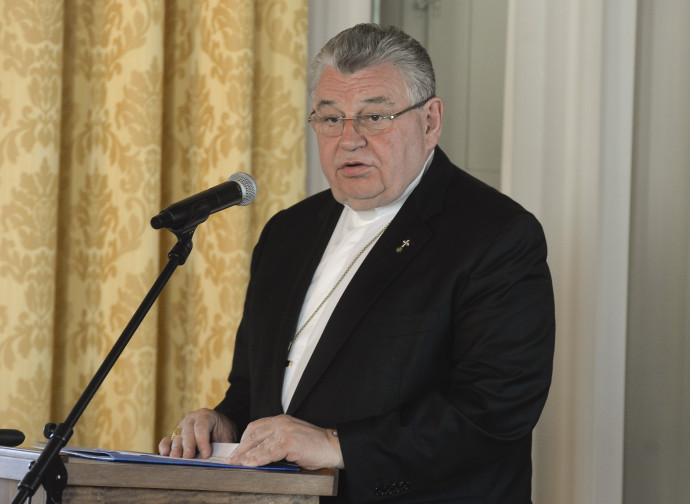Duka: Countering gender ideology is a priority for new Pope
The Archbishop Emeritus of Prague discusses evangelisation and the revival of catechesis. He also addresses the pressing issues facing Leo XIV, including the Chinese dossier, the German synodal drift, and rainbow ideologies, which he views as an extension of communism.

Cardinal Dominik Jaroslav Duka, a Dominican, likes to speak clearly and without frills. Archbishop Emeritus of Prague since 2022, he did not participate in the last conclave, but came to Rome for Pope Leo XIV's first meeting with the Sacred College. Duka did not shy away from questions from the DailyCompass on the hottest issues of the new pontificate.
Your Eminence, are you happy with the new Pope?
Yes, I think a competent man has been elected, one who comes from the continent where the majority of Catholics live today. We Europeans make up only 10% of the world's population! Moreover, as Prior General of the Augustinians, he had the opportunity to visit convents all over the world and gain thorough knowledge of the universal Church. He has visited the Czech Republic at least ten times, for example.
Did you meet him?
Of course. On 30 June 2012, we concelebrated Mass in the monastery of St Dobrotivá for the victims of the communist dictatorship. This Augustinian monastery was closed down as part of Operation K, when the communists closed convents across Czechoslovakia in 1950 and imprisoned religious figures.
What should be the priorities of his pontificate?
Evangelisation must come first. Secondly, I think we need to revive catechesis. The situation in both parishes and schools is catastrophic, with significant differences between continents. In the Czech Republic, gender ideology is a huge problem in schools. This ideology is merely a continuation of Jacobinism and communism. Those who support it are not open to cooperation.
For those of you who have experienced the suffering caused by communism, do you believe that this threat has been overcome?
The idea of communism as a religion is dead. Instead, we are faced with the evolution of communism into modern progressivism. Following Hegel and Marx came Freud, and the era of great utopias that sought to transform humanity into machines devoid of knowledge began.
Let us look at the Church: the result of extreme progressivism is processes such as the synodal one in Germany. What is your opinion of the Synodal Path and its offshoots?
The German Synodal Committee seems to be a continuation of Chancellor Bismarck's Kulturkampf. With a lay president and bishops and lay members on an equal footing, I see the Synodal Committee as a form of dictatorship against the Church. I hope that Leo XIV will intervene. I believe he will reject the German process.
On the other hand, how should the new pope proceed with the agreement with Beijing on the appointment of bishops?
I think the situation there needs to change too. The situation in China reminds me of what happened in Eastern Europe during the communist era. Casaroli's Ostpolitik was not positive. At best, it may have prevented the worst of the persecution, but it also stopped the Church from growing beyond the Iron Curtain. Ultimately, what matters is real experience: the experience of Catholics in Eastern Europe at the time, and the experience of Chinese Catholics today. I must say that we had a good discussion about this during our first meeting with Pope Leone XIV. Cardinal Fernando Filoni also gave a very good speech on the Holy See–China agreement.
Do you think the Trump administration could be an ally of the Holy See in defending religious freedom around the world?
A few months ago at the Munich Security Conference, Vice President J. D. Vance gave a hopeful speech outlining a vision for defending real freedom and human and Christian values. In this sense, there is scope for cooperation as in the days of John Paul II.
The conclave was short.
You see? The reality is that the Church is united in the truth of Christ, despite what the media says.
Yet, the Sacred College did not hide the difficulties caused by their lack of mutual knowledge during the pre-conclave. Is there any advice you would give to Pope Francis regarding the composition of the College of Cardinals?
Globalising the College of Cardinals was necessary and beneficial. However, it is also important to recognise the significance of certain episcopal sees and give due consideration to the position of each Church. For example, I believe that representatives of the Eastern Churches should be present in the Sacred College. One such representative could be the head of the Ukrainian Greek Catholic Church, Sviatoslav Shevchuk.
It seems that Leo XIV will return to live in the Apostolic Palace. Would you be happy about that?
Yes, because tradition is important not only for the Church, but also in everyday life. In the Czech Republic, progressives argue that Prague Castle should no longer be the seat of the president. However, these buildings are more than just symbols; they represent continuity. I must say that I really like Leo XIV's start, but I am not surprised. After all, he is a former student of 'our' university, the Angelicum!
Cardinal Goh: Leo will clarify doctrine
Confusion over Church teaching caused division and polarisation. 'The new Pope will not be ambiguous and will not leave the interpretation of what he says up to each individual,' the Archbishop of Singapore told the Daily Compass.
Synodality: Hollerich attempts to constrain Pope Leo
Amidst the attempts of various cardinals to set the tone for the new pontificate, the ultra-liberal Jesuit, Jean-Claude Hollerich, gains prime position: no revolutions, only evolutions. And woe betide anyone who challenges the synodal 'dogmas'. Today, the real revolution would be a return to order.
